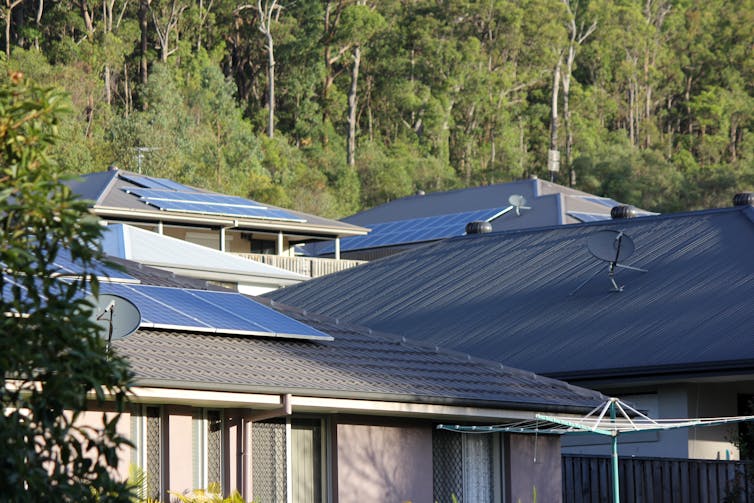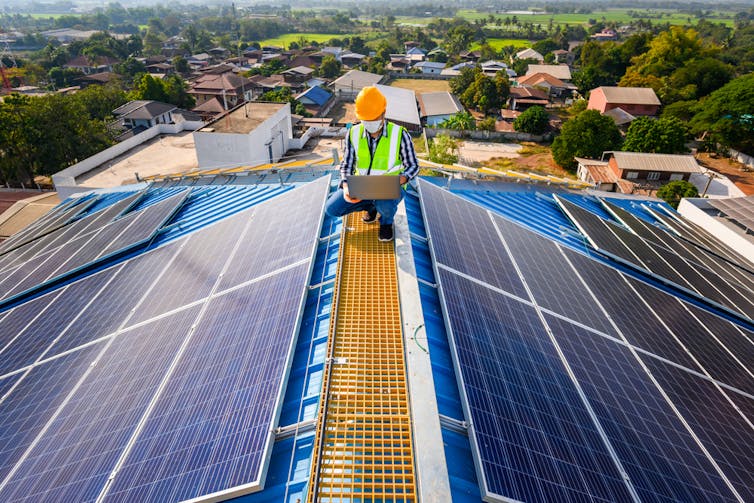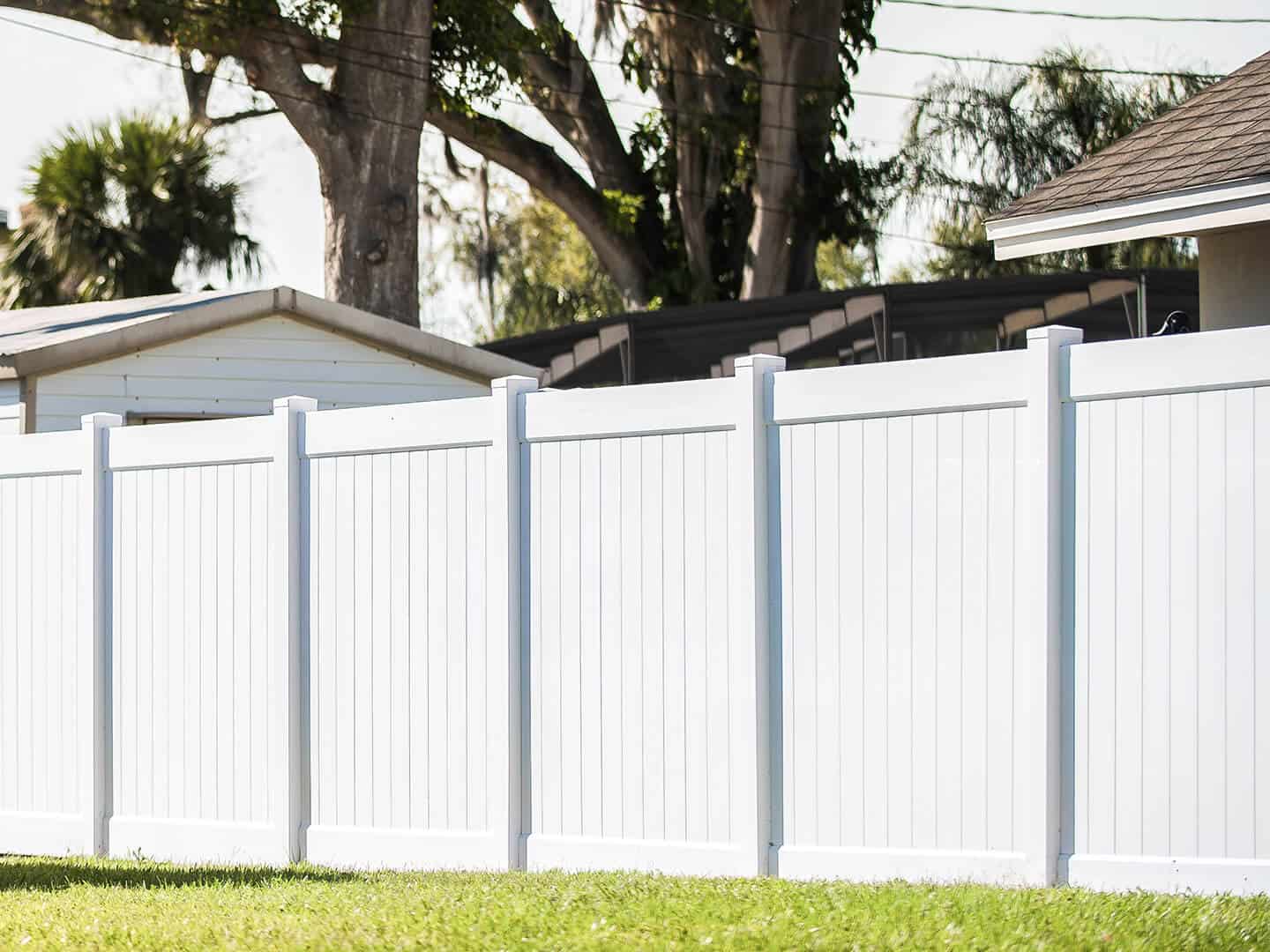Australians are installing rooftop solar like never before. Who is burdened with taking care of it at home?
Rooftop solar panels and tiny batteries are driving Australia’s immediate change toward renewable strength. Some 30% of detached households on Australia’s countrywide grid have these techniques installed. By 2050, this proportion could attain 65%.
This suggests duty for preserving our energy source is shifting from proficient, effectively-paid electric power station engineers to householders. In essence, care for our electricity program is turning out to be housework.
Our new research has identified rooftop photo voltaic upkeep, as with other kinds of housework, has the potential to turn out to be an fairness situation. And the stress of this unrecognised perform is established to worsen as the strength transition accelerates.
If our electrical power technique depends on invisible care, we really should accept who the burden is falling on and no matter if we’re generating new inequalities.
Rooftop solar maintenance as housework
The issues we do to maintain our worlds – be it ourselves, other individuals, the environment or every little thing else — can collectively be imagined of as treatment. Historically, the load of treatment has largely fallen on girls and marginalised communities. When modern society does not value their treatment do the job, inequality is exacerbated.
Housework is a kind of treatment, and it tends to be invisible, unpaid and carried out only by those people who observe it desires undertaking. In quite a few scenarios, this signifies females. What does it signify in the scenario of household power systems?
Read through far more:
Never give mum chocolates for Mother’s Day. Get on additional housework, share the psychological load and advocate for equality alternatively
When a householder decides to set up technologies this sort of as rooftop solar, they have to identify what measurement and form of method will fulfill their requirements and to study products and installers.
At the time the procedure is mounted, they then will need to test it is accomplishing as meant and recognise when maintenance is demanded. When anything goes mistaken, they have to have to observe up with the relevant organisation to resolve it.
We simply cannot however declare just who the burden of rooftop photo voltaic and battery care is slipping to – far more exploration is essential on this. But our latest study discovered the transforming character of residence electrical power has the possible to reproduce present varieties of inequality throughout gender, cultural teams and generations.

Shutterstock
What we identified
We held interviews and concentration teams with 55 Australian house owners from metropolitan and rural parts who ordered vitality technologies, as nicely as 18 persons from installer businesses and neighborhood electricity teams.
We identified they envisage a additional caring electrical power program – one that prioritises generating certain everybody can pay back their bills and facilitates sharing, relatively than just one that rewards people with the most methods and know-how.
We explained the unique kinds of care driving the energy transition, and uncovered examples of neighborhood teams and firms heading earlier mentioned and outside of to supply assistance.
Browse additional:
Difficult, pricey and downright frustrating: Aussies keen to slice emissions with cleanse electrical power at residence get minor support
For instance, some installers we spoke with took time to assist householders have an understanding of what kind and dimensions system greatest suited them. Other folks executed work for absolutely free to assistance someone out, this kind of as just one installer who informed us:
We get shoppers suitable now because the company that set up it will not arrive out and assistance them. That’s really a little something we do market as nicely, is that if you are not our shopper, we’ll support you. A great deal of that is volunteer perform.
But in accordance to other analysis contributors, some installers are only interested in making the sale, leaving neglected paperwork, missing components, or techniques that just really do not do the job. Sometimes the householder is unaware their technique is not doing the job as supposed.
A single girl, a incapacity pensioner, had been sold an costly photo voltaic and battery system that did not work. As she sought electricians to repair it, she lamented they were:
so male-dominated that they don’t want you wanting more than their shoulder […] they’re not willing to clarify issues both.
This illustration highlighted difficulties in setting up rapport involving installers and house owners of various genders, ages or cultural backgrounds, a obtaining shared by other scientists.
Read far more:
‘Smart home’ gadgets assure to slash power charges but quite a few lie idle – or can even strengthen energy use
Analysis from 2017 discovered systems can be misused or ignored when optimistic assumptions are manufactured about their person-friendliness. Other analysis from the United Kingdom confirmed builders of household technologies almost never involve end users in the style and design approach, and are inclined to layout for an idealised masculine customer.
These unique dynamics compound to the level in which our strength procedure is intended to benefit all those who understand its complexity and are in a position to choose gain.

Shutterstock
A caring vision for our power foreseeable future
We also found our investigate participants required their caring visions for the foreseeable future greater represented in government insurance policies.
For many, setting up power know-how was about performing the proper issue for the planet, instead than to lower their electric power costs or come to be self-enough in power. But they explained to us how tips based mostly in care are not frequently taken very seriously by business and federal government.
Authorities incentive techniques that support individuals find the money for solar and batteries are vital and helpful. But they also give increase to opportunistic product sales tactics and pitfalls for householders.
Examine additional:
What is a grid, anyway? Making perception of the intricate beast that is Australia’s energy community
Incentive courses need to have to spot superior anticipations on installers and expel operators with poor monitor records. A lot more assertive regulation is essential that goes further than straightforward purchaser protections and places considerably less of an onus on householders to navigate their way on your own. Governments can also assistance neighborhood teams that enable in this task.
Policies should also accommodate caring, community-centered homeowners who aren’t just putting in rooftop photo voltaic to reward them selves. It could involve permitting totally free or minimal-price power sharing at the nearby scale to enable out neighbours and stay clear of spilling excess photo voltaic to the broader grid.
If we don’t recognise and act on generating a caring energy program, we could be still left with just one that is partially crafted, unfair and rewards a race to the base.








